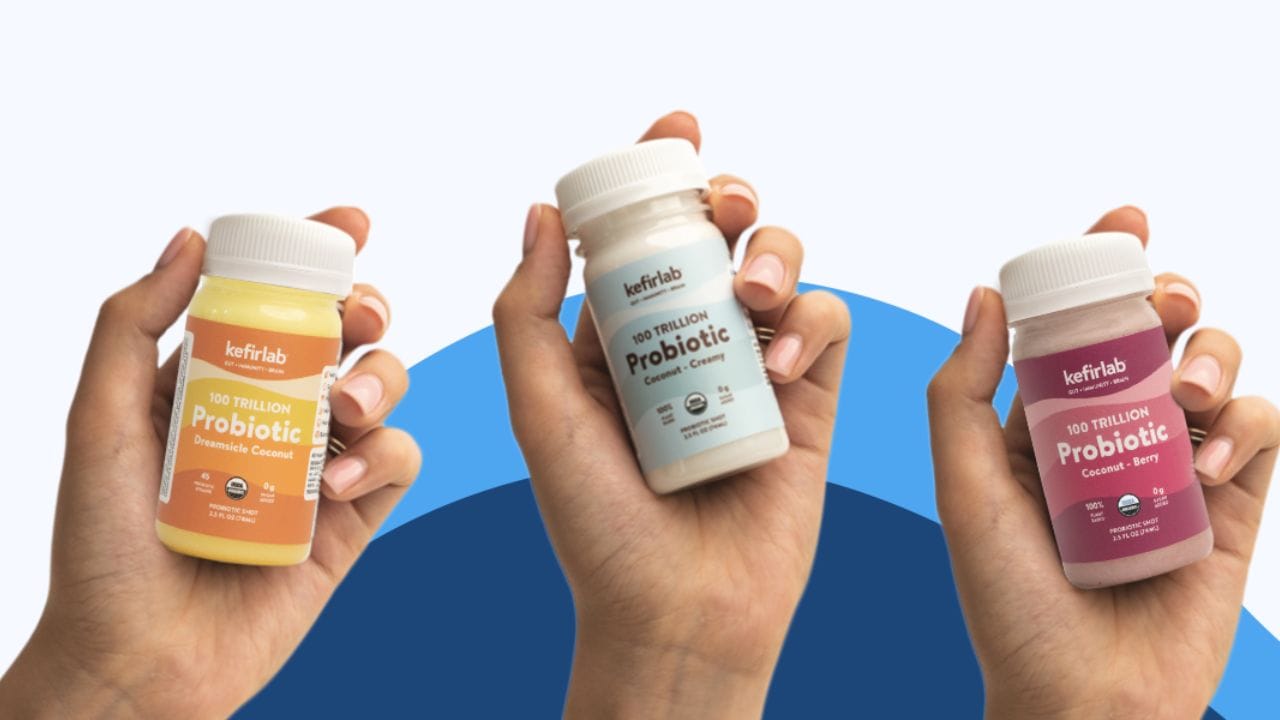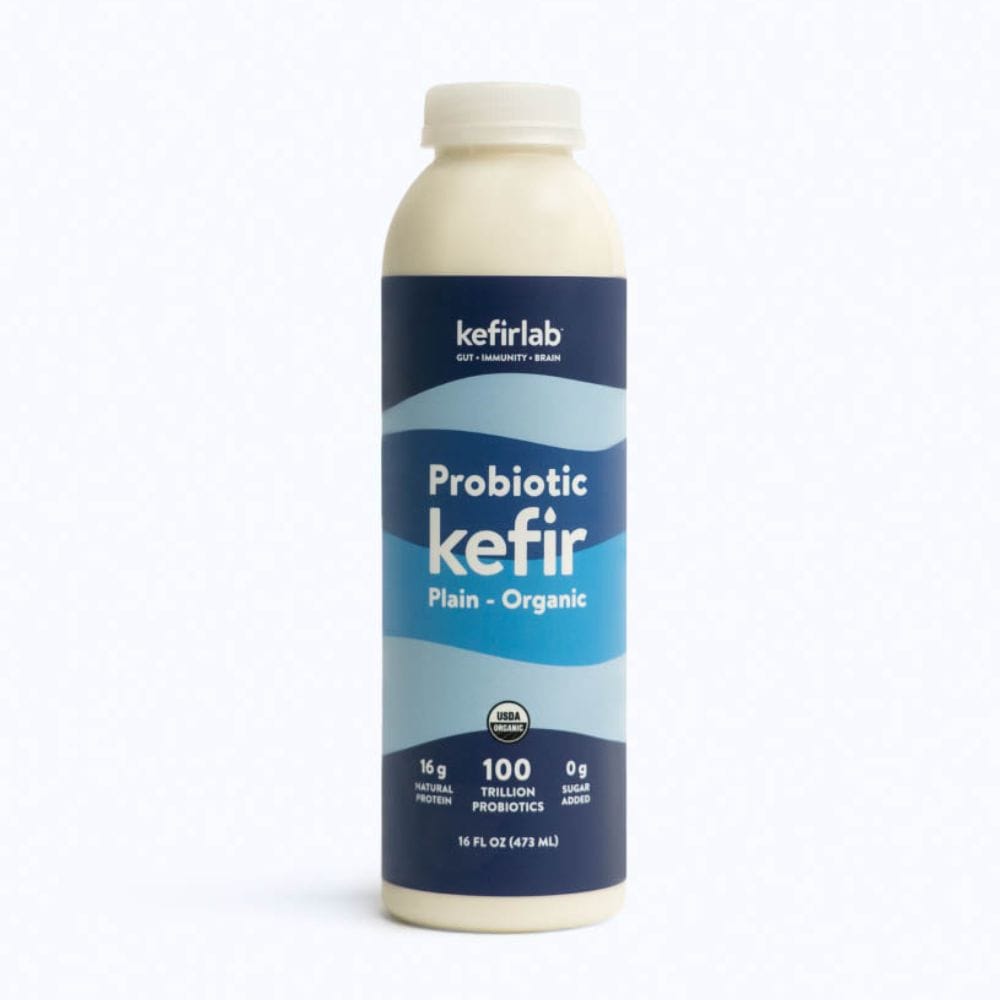Key Takeaways:
- Drinking kefir daily can offer numerous health benefits, including improved digestion and enhanced immune function.
- Kefir is a versatile fermented drink that can be consumed by individuals with lactose intolerance due to its probiotic content.
- Regular kefir consumption supports gut health, and bone health, and may help manage blood sugar levels.
Introduction to Kefir
Kefir, a probiotic-rich fermented milk drink, has been gaining popularity as a health food due to its rich probiotic content and numerous health benefits. Originating from the Caucasus Mountains, this tangy beverage is made by adding kefir grains to cow’s milk, goat’s milk, or even water. The fermentation process involves a symbiotic culture of bacteria and yeast, resulting in a drink teeming with beneficial bacteria.
The question on many people’s minds is, “Is it safe to drink kefir every day?” This article delves into the health benefits of kefir, its potential side effects, and whether daily consumption is advisable.
How We Choose
Our team has spent hours researching through thousands of user reviews and star ratings for the best supplements on the market. We take into account factors such as taste, nutrition, ingredients, sustainability, and affordability when recommending products to our readers. We strive to find the best options that meet everyone’s needs - even those on a budget!
We hope this may be your next special item! This product was independently selected by our editors. Good Guru Reviews may collect a share of sales or other compensation from the links on this page if you decide to buy something (at no additional cost to you, that's how we stay in business). As always, enjoy finding your next special item with us!

Health Benefits of Kefir
Improved Digestion
One of the most significant health benefits of kefir is its ability to improve digestion. The probiotic bacteria in kefir help maintain a healthy balance of gut microbiome, which is crucial for proper digestive function. Consuming kefir can alleviate symptoms of irritable bowel syndrome (IBS) and inflammatory bowel disease (IBD).
Enhanced Immune Function
Kefir is rich in probiotics, which play a vital role in supporting the immune response and the immune system. Regular consumption of kefir can help strengthen the body’s defenses against certain harmful bacteria and viruses. The lactic acid bacteria in kefir also produce antimicrobial substances that inhibit the growth of pathogens.
Kefir and Lactose Intolerance
Kefir Improves Lactose Digestion
For those who are lactose intolerant, kefir can be a game-changer. The fermentation process breaks down lactose, the milk sugar that many people find difficult to digest, using the lactase enzyme. This makes kefir a suitable option for individuals who typically avoid dairy products.
Kefir as a Lactose-Free Option
In addition to traditional milk kefir, there are lactose-free versions available, such as water kefir and kefir made from coconut milk. These alternatives provide the same probiotic benefits without the lactose, making them accessible to a broader audience.

Nutritional Value of Kefir
Rich in Nutrients
Kefir is a nutritional powerhouse, packed with essential amino acids, essential vitamins, and minerals. It contains B vitamins, calcium, magnesium, and phosphorus, all of which are vital for maintaining healthy bones and overall well-being. The high calcium content in kefir supports bone health and helps prevent osteoporosis.
Low in Calories
Despite its rich nutritional profile, kefir is relatively low in calories. This makes it an excellent choice for those looking to maintain a healthy weight while still getting essential nutrients. Low-fat kefir options are also available for those who prefer a lighter version of this fermented drink.
Kefir and Blood Sugar Control
Helps Manage Blood Sugar
Kefir has been shown to help manage glycemic index and blood sugar levels, making it a beneficial addition to the diet of individuals with diabetes. The probiotics in kefir can improve insulin sensitivity and reduce blood sugar spikes after meals.
Supports Metabolic Health
Regular consumption of kefir can also support overall metabolic health. The beneficial bacteria in kefir help regulate the digestive tract, which in turn can positively impact metabolic processes and weight management.

Kefir and Bone Health
Adequate Calcium Intake
Kefir is an excellent source of calcium, which is essential for maintaining strong and healthy bones, including bone density. Adequate calcium intake is crucial for preventing bone-related conditions such as osteoporosis and fractures.
Supports Healthy Bones
In addition to calcium, kefir contains other nutrients like phosphorus and magnesium that are vital for bone health. These minerals work together to strengthen bones and improve overall skeletal health.

Kefir and Gut Health
Probiotic Foods for Gut Health
Kefir is one of the best probiotic foods for improving gut health. The beneficial bacteria in kefir help maintain a healthy balance of gut microbiota diversity, which is essential for proper digestive function and overall health.
Kefir Drink Leads to Better Digestion
Regular consumption of kefir can lead to better digestion and reduced symptoms of digestive disorders. The probiotics in kefir help break down food more efficiently and promote the absorption of nutrients.
Kefir and Immune System
Strengthens Immune Function
The probiotics in kefir play a crucial role in supporting the immune system. Regular consumption of kefir can help strengthen the body’s defenses against antiviral properties, infections, and diseases.
Antimicrobial Properties
Kefir contains lactic acid bacteria that produce antimicrobial substances, which can inhibit the growth of harmful pathogens. This makes kefir a valuable addition to the diet for maintaining overall health and preventing infections.

Kefir and Weight Management
Low-Calorie Option
Kefir is a low-calorie beverage that can be included in a weight management plan. Its high protein content helps keep you feeling full and promotes satiety, reducing the likelihood of overeating.
Supports Metabolic Health
The probiotics in kefir can support metabolic health by improving digestion and nutrient absorption. This can lead to better weight management and overall health.

Kefir and Skin Health
Promotes Healthy Skin
The probiotics in kefir can also benefit skin health. They help maintain a healthy balance of gut bacteria, which can reduce inflammation and have anti-inflammatory properties, improving skin conditions such as acne and eczema.
Rich in Nutrients
Kefir is rich in vitamins and minerals that are essential for healthy skin. These nutrients help nourish the skin from within, promoting a healthy and radiant complexion.

Kefir and Mental Health
Supports Mental Well-Being
The gut-brain connection is well-documented, and the probiotics in kefir can play a role in supporting mental health. Regular consumption of kefir can help reduce symptoms of anxiety and depression by promoting the neurotransmitter production.
Improves Mood
The beneficial bacteria in kefir can improve mood by promoting the production of neurotransmitters such as serotonin. This can lead to better mental well-being and overall happiness.

Kefir and Heart Health
Supports Heart Health
Kefir can support heart health by improving cholesterol levels and reducing blood pressure. The probiotics in kefir help maintain a healthy balance of gut bacteria, which can positively impact heart health.
Reduces Inflammation
The anti-inflammatory properties of kefir can help reduce inflammation in the body, which is a risk factor for heart disease. Regular consumption of kefir can support overall cardiovascular health.

Kefir and Blood Pressure
Helps Lower Blood Pressure
Kefir has been shown to help lower blood pressure, making it a beneficial addition to the diet for individuals with hypertension. The probiotics in kefir can improve blood vessel function and reduce blood pressure levels.
Supports Cardiovascular Health
Regular consumption of kefir can support overall cardiovascular health by improving cholesterol levels and reducing inflammation. This can lead to better heart health and reduced risk of heart disease.

Kefir and Bone Health
Rich in Calcium
Kefir is an excellent source of calcium, which is essential for maintaining strong and healthy bones and bone mineral density. Adequate calcium intake is crucial for preventing bone-related conditions such as osteoporosis and fractures.
Supports Bone Density
In addition to calcium, kefir contains other nutrients like phosphorus and magnesium that are vital for bone health. These minerals work together to strengthen bones and improve overall skeletal health.

Kefir and Digestive Health
Improves Digestion
Kefir is one of the best probiotic foods for improving digestion. The beneficial bacteria in kefir help maintain a healthy balance of digestive enzymes and gut microbiota, which is essential for proper digestive function and overall health.
Reduces Digestive Disorders
Regular consumption of kefir can lead to better digestion and reduced symptoms of digestive disorders. The probiotics in kefir help break down food more efficiently and promote the absorption of nutrients.

Kefir Lab Probiotic Kefir-Also Other Flavors
With doctor-developed formula and Italian taste craftsmanship, their Plain Kefir gives your biome everything it could ask for – the market’s highest 100 trillion CFU with a smooth, rich finish.
Summary
Drinking kefir every day, or daily kefir consumption, can offer a multitude of health benefits, from improved digestion and enhanced immune function to better bone health and blood sugar control. This versatile fermented drink is suitable for individuals with lactose intolerance and can be enjoyed in various forms, including traditional milk kefir, water kefir, and coconut milk kefir. With its rich nutritional profile and numerous health benefits, kefir is a valuable addition to any diet.
As always, consult with your physician before starting any new supplement regimen to check about potential interactions with other supplements or medications. The information presented in this document is purely for educational purposes and should not be construed as medical advice.
While every effort has been made to ensure the accuracy and reliability of the information provided, all health-related decisions should be made in consultation with a qualified healthcare professional. The author does not take any liability for the health decisions made by the reader.
FAQ
Is it safe to drink kefir everyday?
Yes, it is safe to drink kefir fermented dairy products every day. Regular daily consumption of kefir can provide numerous health benefits, including improved digestion, enhanced immune function, and better bone health. However, it is essential to start with small amounts and gradually increase intake to allow your body to adjust to the probiotics.
Can lactose-intolerant individuals drink kefir?
Yes, lactose-intolerant individuals can drink kefir milk. The fermentation process breaks down lactose, making it easier to digest. Additionally, there are lactose-free options available, such as water kefir and coconut milk kefir.
What are the potential side effects of drinking kefir?
While kefir is generally safe for most people, some individuals may experience mild side effects, such as bloating or digestive discomfort, especially when first introducing it into their diet. These symptoms usually subside as the body adjusts to the probiotics. If you experience severe or persistent side effects from these fermented foods, it is advisable to consult a healthcare professional.










